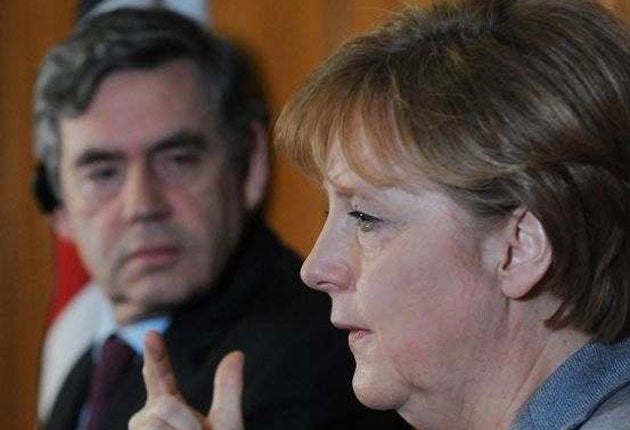Merkel tips Brown's grand plan into crisis
Germany's Chancellor receives French backing as she uses a London meeting to warn against proposals to pump billions more into the global economy

Your support helps us to tell the story
From reproductive rights to climate change to Big Tech, The Independent is on the ground when the story is developing. Whether it's investigating the financials of Elon Musk's pro-Trump PAC or producing our latest documentary, 'The A Word', which shines a light on the American women fighting for reproductive rights, we know how important it is to parse out the facts from the messaging.
At such a critical moment in US history, we need reporters on the ground. Your donation allows us to keep sending journalists to speak to both sides of the story.
The Independent is trusted by Americans across the entire political spectrum. And unlike many other quality news outlets, we choose not to lock Americans out of our reporting and analysis with paywalls. We believe quality journalism should be available to everyone, paid for by those who can afford it.
Your support makes all the difference.Gordon Brown's grand plan to save the global economy was in crisis last night when the German Chancellor, Angela Merkel, refused to commit to a new global fiscal stimulus package to steer the world out of recession.
In a pointed warning to the Prime Minister, the German leader said it was too early to measure the effects of the first multibillion-dollar stimulus to give the go-ahead for any more state aid.
Mrs Merkel was backed up by Christine Lagarde, the French Finance Minister, who said nations needed to assess the impact of earlier measures before making any further tax and spend decisions
Mrs Merkel's remarks, made in a press conference alongside Mr Brown after talks in Downing Street, cast a shadow over yesterday's G20 meeting of finance ministers in Horsham, West Sussex, and Britain's attempts to secure a lasting rescue plan in the wake of the world's worst economic crisis since the 1930s.
France and Germany, two of Europe's largest economies, are reluctant to back the moves, instead calling for tougher financial regulation.
Finance ministers and central bank governors from the G20 group of rich and emerging nations, hosted by the Chancellor, Alistair Darling, tried to steer clear of the rift by agreeing a package of measures, including pumping more cash into the International Monetary Fund to rescue struggling countries. They also pledged to boost bank lending and to support developing nations. But there was no agreement on who would provide the money to the IMF.
In a blueprint for a meeting of G20 leaders, which is due to take place in London on 2 April, the finance ministers vowed to make a "sustained effort" to revive the global economy.
At the Downing Street press conference, Mrs Merkel said that Germany had already committed 4.2 per cent of GDP to a fiscal stimulus, putting her country at the "vanguard" of the global rescue effort.
Asked whether additional money was necessary, she said: "Nothing has actually taken effect on the ground yet. If we want to make real impact you really must implement the package first before you talk about the next step."
The German Chancellor said it was for individual countries to decide on further tax and spend decisions, adding: "We will talk to our parliamentarians about that."
Germans did not suffer the same problems with home loan and credit card debt that Americans had, she said, adding: "We must return to a solid, sustainable fiscal policy after the crisis. So we have got to signal to markets that on the one hand we are
tackling the crisis decisively and that, on the other, we will permanently avoid excessive global imbalances."
Speaking in Horsham, Mr Lagarde said that nations needed "to evaluate the remedies already put in place".
The tensions undermined Mr Brown's attempts to present a united front with Germany ahead of the London summit. The Prime Minister said: "I think you will find that countries will be agreeing together about what we are going to do in future, both in fiscal and monetary policy and in the regulatory system. I believe that we are setting a path with the G20 where, one by one, we are reaching agreement on the big issues for the future."
Mr Brown and Mrs Merkel agreed on the need for tougher regulation of hedge funds, and were confident they would secure American backing. But the rift was seized on by the Conservatives, who are seeking to make political capital out of David Cameron's apology on Friday for not anticipating the recession.
The Shadow Chancellor, George Osborne, said: "Hopefully this weekend Gordon Brown has learnt his lesson that he should stop trying to use the international stage to fight his domestic political battles, and instead focus on getting international agreement on banking reform and trade that really would have a stimulating effect."
The US Treasury Secretary, Timothy Geithner, praised the "broad-based consensus globally on the need to act aggressively to restore growth".
Join our commenting forum
Join thought-provoking conversations, follow other Independent readers and see their replies
0Comments